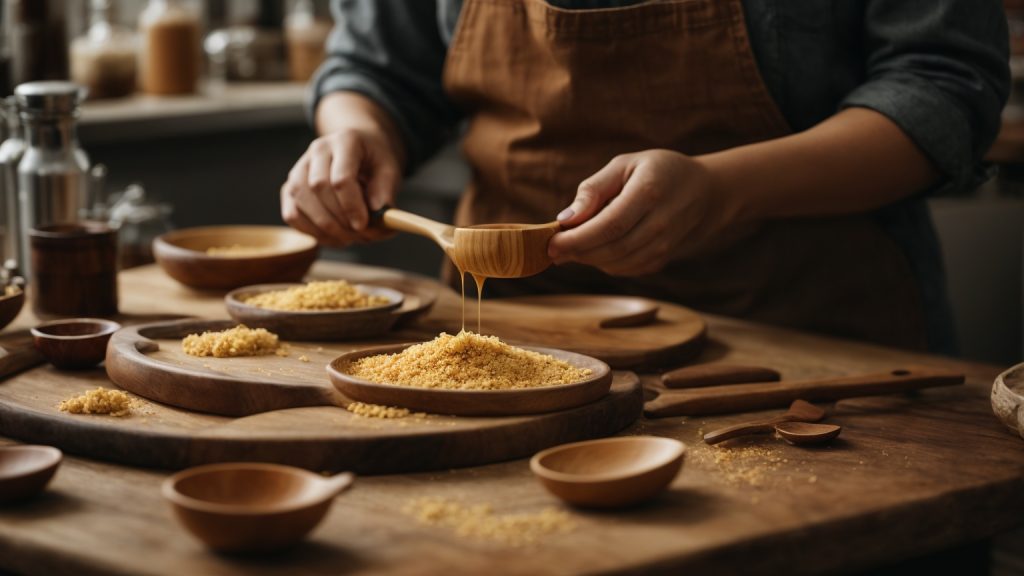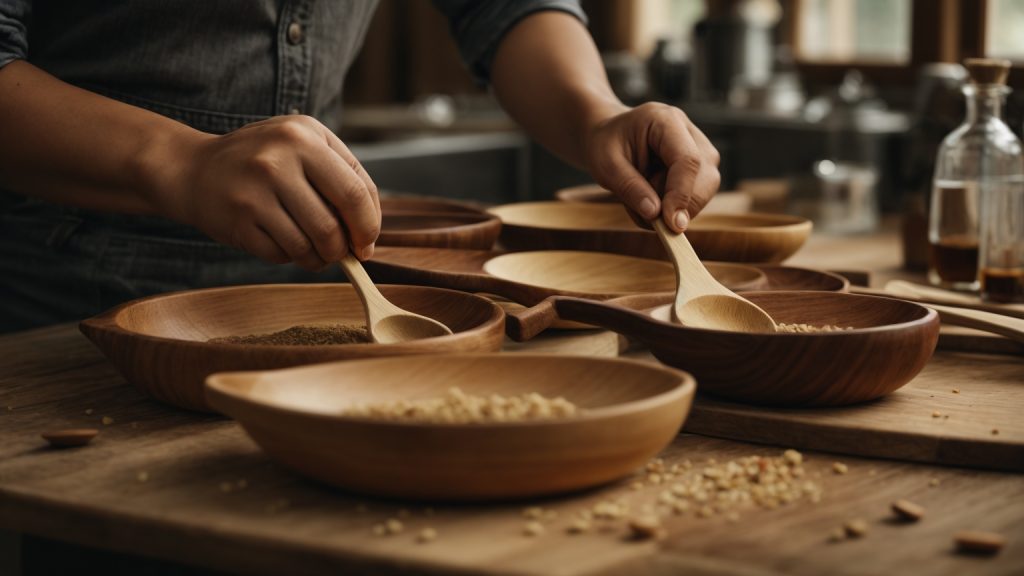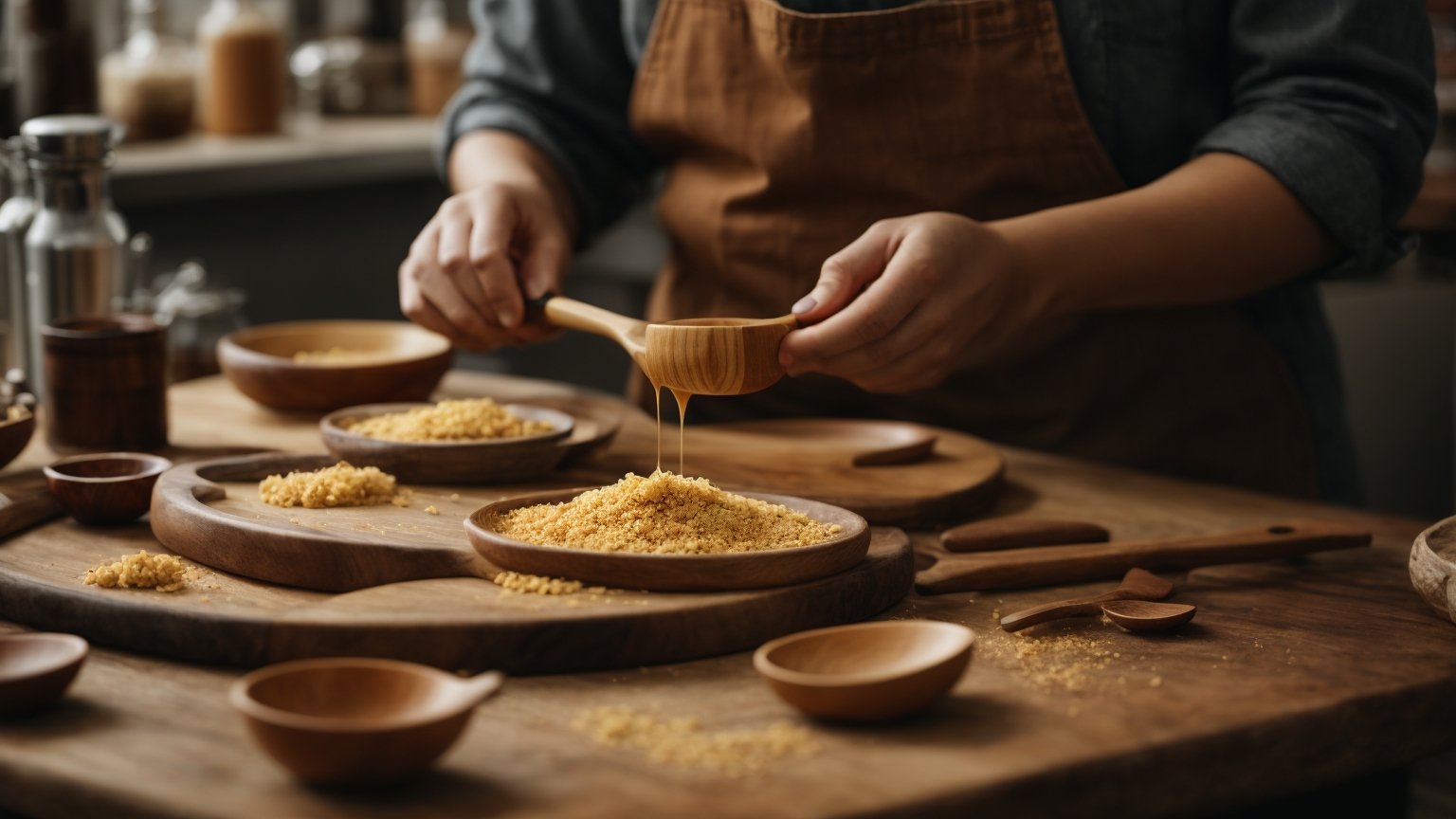If you’re someone who loves to cook, you probably have a collection of wooden spoons and cutting boards in your kitchen. Wooden spoons are a versatile tool that can be used for stirring, mixing, and even serving. However, over time, wooden spoons can become dry and brittle, making them more susceptible to cracking and splintering. That’s where oiling comes in – it’s a simple process that can help keep your wooden spoons in great condition for years to come.
To oil your wooden spoons, you’ll need to choose an oil that’s safe for food use. Mineral oil is a popular choice, as it’s odorless, tasteless, and won’t go rancid. You can also use walnut oil, tung oil, or linseed oil – just be sure to read the label to make sure it’s safe for food use. Once you’ve chosen your oil, you’ll want to apply it generously to your wooden spoons, making sure to cover all surfaces. Let the oil soak in for at least 30 minutes, or overnight if possible, before wiping off any excess with a clean cloth.
By oiling your wooden spoons regularly, you’ll help keep them from drying out and cracking, which can extend their lifespan and make them a joy to use for years to come. With just a little bit of effort and the right oil, you can keep your wooden spoons in great condition and enjoy using them in your kitchen for many meals to come.
Understanding Wooden Spoons

Wooden spoons are a staple in any kitchen. They are versatile, durable, and gentle on cookware. However, they require proper care and maintenance to ensure their longevity. In this section, we will discuss the benefits of using wooden spoons, the different types of wood used to make them, and how to properly care for them.
Benefits of Using Wooden Spoons
There are several benefits to using wooden spoons. They are:
- Gentle on cookware: Unlike metal utensils, wooden spoons do not scratch or damage non-stick cookware.
- Versatile: Wooden spoons can be used for stirring, mixing, scraping, and even serving.
- Durable: Wooden spoons can last for years with proper care and maintenance.
- Natural and eco-friendly: Wooden spoons are made from renewable resources and are biodegradable.
Types of Wood Used to Make Wooden Spoons
Different types of wood are used to make wooden spoons. The most common types are:
- Maple: Maple wood is hard and durable, making it ideal for kitchen utensils. It has a light color and a tight grain pattern.
- Cherry: Cherry wood is also hard and durable. It has a reddish-brown color and a distinctive grain pattern.
- Olive: Olive wood is dense and heavy, making it perfect for cooking utensils. It has a unique grain pattern and a warm color.
Caring for Wooden Spoons
Proper care and maintenance are essential to keep your wooden spoons in good condition. Here are some tips:
- Wash your wooden spoons by hand with warm, soapy water. Avoid soaking them in water as it can cause the wood to warp or crack.
- Dry them thoroughly after washing. You can air dry them or use a towel to dry them off.
- Oil your wooden spoons regularly to prevent them from drying out and cracking. Use food-grade mineral oil or walnut oil to oil your spoons.
- Store your wooden spoons in a dry place away from heat and moisture. A utensil holder or a drawer organizer is ideal for storing them.
By following these tips, you can keep your wooden spoons in good condition for years to come.
Why Oiling is Important
If you use wooden spoons regularly, it’s important to keep them in good condition. Oiling your wooden spoons can help extend their lifespan and keep them looking beautiful. Here are a few reasons why oiling is important:
Prevents Drying and Cracking
Wooden spoons can dry out over time, especially if they’re exposed to heat or moisture. When wood dries out, it can become brittle and prone to cracking. Oiling your spoons helps to keep them hydrated, preventing them from drying out and cracking.
Protects Against Stains and Odors
Wooden spoons can absorb stains and odors from the foods you’re cooking. Oiling your spoons can help to create a barrier that protects against these stains and odors. This can help to keep your spoons looking and smelling great for longer.
Enhances the Wood’s Natural Beauty
Oiling your wooden spoons can bring out the natural beauty of the wood. It can help to highlight the grain and color of the wood, giving your spoons a unique and attractive appearance.
Improves Grip and Comfort
Oiling your wooden spoons can also improve their grip and comfort. The oil can help to smooth out any rough spots on the spoon, making it more comfortable to use. Additionally, the oil can help to create a non-slip surface, making it easier to grip the spoon while you’re cooking.
Overall, oiling your wooden spoons is an easy and effective way to keep them in great condition. By preventing drying and cracking, protecting against stains and odors, enhancing the wood’s natural beauty, and improving grip and comfort, oiling can help to extend the lifespan of your spoons and keep them looking and feeling great for years to come.
Choosing the Right Oil

When it comes to oiling wooden spoons, there are a few options to consider. Here are three popular choices:
Food Grade Mineral Oil
Food grade mineral oil is a popular choice for oiling wooden spoons and cutting boards. It is a colorless, odorless, and tasteless oil that is safe for food contact. Mineral oil is also affordable and easy to find in most stores.
To use mineral oil, simply apply a small amount to the wood surface and rub it in with a clean cloth. Let it sit for a few hours or overnight, then wipe away any excess oil with a dry cloth. Repeat this process every few months to keep your wooden spoons in good condition.
Beeswax
Beeswax is a natural wax that can be used to protect and seal wooden spoons. It creates a barrier that prevents moisture from penetrating the wood and helps to prevent cracking. Beeswax also gives wooden spoons a warm, natural finish.
To use beeswax, melt a small amount in a double boiler or microwave. Apply the melted wax to the wood surface using a clean cloth or brush. Let it sit for a few minutes, then buff the surface with a dry cloth to remove any excess wax. Repeat this process every few months to maintain the protective barrier.
Coconut Oil
Coconut oil is a popular alternative to mineral oil for those who prefer a natural option. It is a solid oil at room temperature, but melts easily when warmed up. Coconut oil is also known for its antibacterial properties, which can help to keep wooden spoons clean and hygienic.
To use coconut oil, warm up a small amount until it becomes liquid. Apply the oil to the wood surface using a clean cloth, and rub it in well. Let it sit for a few hours or overnight, then wipe away any excess oil with a dry cloth. Repeat this process every few months to keep your wooden spoons in good condition.
Remember, whichever oil you choose, be sure to use a food-grade option that is safe for food contact. And always follow the manufacturer’s instructions for best results.
Oiling Process
Wooden spoons are a great addition to any kitchen, but they require proper care to maintain their quality and longevity. One of the most important steps in caring for your wooden spoons is oiling them regularly. Here is a step-by-step guide on how to oil your wooden spoons properly.
Cleaning the Spoons
Before you start oiling your wooden spoons, you need to make sure they are clean. Wash them with warm soapy water and rinse thoroughly. You can also use a mild abrasive like baking soda to remove any stains or discoloration. Once the spoons are clean, dry them with a towel and allow them to air dry completely.
Applying the Oil
Now it’s time to apply the oil. There are many different types of oils you can use, but we recommend using food-grade mineral oil or walnut oil. These oils are safe for use with food and will not turn rancid over time. Pour a small amount of oil onto a clean cloth and rub it into the wood, making sure to cover all surfaces. You can also use a brush to apply the oil if you prefer. Be sure to apply the oil generously, but not so much that it pools on the surface.
Drying and Curing
After you have applied the oil, let the spoons sit for at least 30 minutes to allow the oil to penetrate the wood. You can also let the spoons sit overnight for best results. Once the oil has had time to soak in, wipe off any excess with a clean cloth. Then, place the spoons in a well-ventilated area to dry and cure for at least 24 hours. This will help the oil to fully cure and harden, creating a protective barrier on the surface of the wood.
By following these simple steps, you can keep your wooden spoons in great condition for years to come. Remember to oil them regularly to prevent drying and cracking, and to keep them looking their best.
Maintaining Oiled Spoons
After oiling your wooden spoons, it is important to maintain them properly to ensure their longevity. Here are some tips on how to maintain your oiled spoons:
Regular Oiling
To keep your wooden spoons in good condition, it is recommended to oil them regularly. This will help prevent the wood from drying out, which can cause cracking and splintering. You can use food-grade mineral oil or coconut oil to oil your spoons.
To oil your spoons, simply apply a small amount of oil to a soft cloth or paper towel and rub it onto the surface of the spoon. Make sure to cover all crevices and the handle. Leave the oil on the spoon for a few hours or overnight to allow it to soak into the wood.
Avoiding Dishwasher
It is important to avoid washing your wooden spoons in the dishwasher. The high heat and harsh detergents can damage the wood and cause it to dry out. Instead, wash your spoons by hand using warm water and mild dish soap.
After washing, dry your spoons thoroughly with a clean towel and let them air dry completely before storing them. Do not store your spoons in a damp or humid environment, as this can cause the wood to warp or crack.
By following these simple tips, you can maintain the beauty and functionality of your oiled wooden spoons for years to come.
